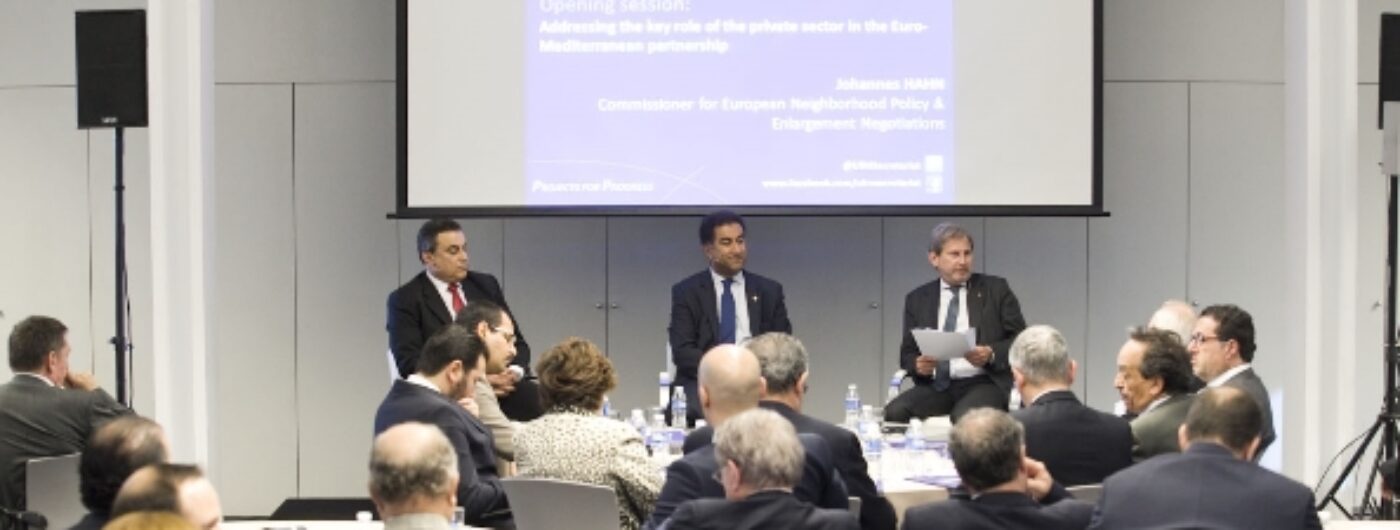
The private sector as a driving force for regional integration
Barcelona, 14 April 2015 – The Union for the Mediterranean organised together with the European Commission a two-day High-level Meeting on the role of the private sector in strengthening the Euro-Mediterranean Partnership.
The meeting, which gathered more than 100 representatives from the private sector, international and regional organisations and International Financial Institutions (IFIs), took place immediately after the informal Ministerial Conference held yesterday at Palau de Pedralbes, headquarters of the UfM, to discuss the future of the European Neighborhood Policy (ENP). The revision of the ENP provides an opportunity to emphasize the need for strengthening the role of the private sector and improving the business environment across the region.
Discussions aimed at fostering dialogue between stakeholders from the private sector and main financial institutions on key strategic issues for the future of the region: inclusive growth and job creation, Public-Private Partnerships (PPP) and informal economy. According to a survey by the European Investment Bank: in 2013, major financial institutions have committed more than 1.5 billion euros for the private sector in the region and the estimation of infrastructure investment needs for 2020 for southern Mediterranean countries are of the order of € 23 billion per year, or a total of $ 160 billion over 7 years; in addition, data from the World Bank show that the informal economy could represent over 65% of employment in Southern Mediterranean countries.
At the opening speech at the Caixa Forum in Barcelona, Secretary General Sijilmassi said to participants that this meeting “will allow continuing the regional dynamic and to associate more closely private sector with UfM activities and also to identify how UfM can support private sector ideas and initiates”.
Commissioner Hahn stated: “A flourishing economy across the Mediterranean is key to reach our shared objectives of stability and prosperity and for that the private sector must be at the core of any successful process”. He also highlighted the important role played by the Union for the Mediterranean in promoting private sector-led growth and employment in the Southern Partners.
Former Prime Minister from Tunisia stressed that “private sector needs to open the door to young unemployed people. We cannot tackle unemployment without the private sector”.
This meeting is part of an ongoing process in the framework of the UfM strategy for the private sector development, launched at the end of last year, and that has initiated the first regional dynamic with the private sector. As first steps of this strategy, the Secretariat organized last year two working meetings to engage private sector players in addressing the region’s challenges through consultations and discussions with international financial institutions (IFIs), private companies, international and regional organisations as well as civil society representatives. The three key strategic issues discussed during today’s meeting were raised by the participants on those occasions.
Today’s meeting also served to identify other priority issues for the development of the private sector in the region: access to finance, labour rights and social responsibility, which could be addressed in future meetings in the framework of this strategy. The UfM foresees as well the organization this year of two other High-level private sector meetings on food security (5/6 May 2015) and energy (second semester).
Private sector development is key to seizing existing business opportunities and fostering regional integration in the Mediterranean by raising the current levels of intra-regional trade, only 5% of total external trade, low compared to 65% among EU countries, 22% of ASEAN countries and 19% of MERCOSUR countries.
FURTHER INFORMATION
- UfM Secretariat to boost private sector’s role on inclusive growth in Euro-Mediterranean countries
- Focus on private sector development: UfM and EU hold seminar gathering EU Heads of cooperation and private sector representatives
PHOTO GALLERY
VIDEO GALLERY
Statement by EU Commissioner Hahn

